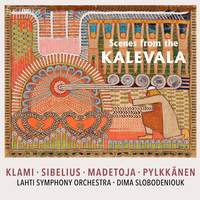Recording of the Week,
Scenes from the Kalevala - Finnish Orchestral Music
Maybe I just need to get out more, but I think one of the greatest pleasures is the joy of discovering new music, and so it is bordering on sinful to have had this experience thrice over in the course of a single album with these performances by the Lahti Symphony Orchestra and Dima Slobodeniouk of orchestral works by four Finnish composers. The common theme is that they are all inspired by the Kalevala, a nineteenth-century work of epic poetry considered to be one of the most important examples of Finnish literature. The influence it has had on artists across multiple disciplines is undeniable, and if I throw out some names of people and places contained within it, such as Kullervo, Pohjola, Lemminkäinen, and Tuonela, then lovers of Sibelius will immediately register how fruitful a source that was for him.
 The main work here is Uuno Klami's five-movement Kalevala Suite, Op. 23, a wonderfully evocative piece, particuarly in the opening movement entitled 'The Creation of the Earth'. Written in 1913 (the same year as Stravinsky's Rite of Spring), it is a teeming depiction of chaos turning to order, with swirling woodwinds and biting trombones giving way to gentler horns, bassoons, and strings in the second movement, 'The Sprout of Spring'. For me the highlight comes in the fourth movement ('Cradle Song for Lemminkäinen'), a melancholic lullaby featuring a dolorous cor anglais solo, which in its melody and underlying harmonies put me very much in mind of 'Åse's Death' from Grieg's Peer Gynt, while the end of the same movement moves into an almost Mahlerian sense of tender repose and longing.
The main work here is Uuno Klami's five-movement Kalevala Suite, Op. 23, a wonderfully evocative piece, particuarly in the opening movement entitled 'The Creation of the Earth'. Written in 1913 (the same year as Stravinsky's Rite of Spring), it is a teeming depiction of chaos turning to order, with swirling woodwinds and biting trombones giving way to gentler horns, bassoons, and strings in the second movement, 'The Sprout of Spring'. For me the highlight comes in the fourth movement ('Cradle Song for Lemminkäinen'), a melancholic lullaby featuring a dolorous cor anglais solo, which in its melody and underlying harmonies put me very much in mind of 'Åse's Death' from Grieg's Peer Gynt, while the end of the same movement moves into an almost Mahlerian sense of tender repose and longing.
Even the included piece by Sibelius is a new discovery to the extent that it is the first recording of the 1897 version of Lemminkäinen in Tuonela from the Lemminkäinen Suite. In all honesty, as far as I can tell the differences between this and the final, 1939 version are fairly minor, the only significant change being a shortening of the transition back into the opening material towards the end. Nevertheless, it's good to have this earlier version in full (a previous Lahti recording under Osmo Vänskä only recorded the truncated passage as an excerpt rather than the whole piece).
Two of the compositions focus on the character of Kullervo, a tragic figure sold into slavery as a child, who ends up inadvertently seducing his own sister (who commits suicide when she learns of the incest), subsequently seeking revenge on the tribe of Untamo (who, he learns, had massacred his entire family when he was very young), destroying them all before committing suicide himself. Such a dramatic tale is ripe for provoking some similarly striking music, and that's precisely what we get with Leevi Madetoja's Kullervo, from 1913, which contrasts stormy outer sections with a central interlude filled with beautiful solos for clarinet and oboe especially.
Of all of these, however, I think my favourite has to be Tauno Pylkkänen's Kullervo Goes to War. Writtten in 1942 when Pylkkänen was 24, it's full of youthful exuberance and many colourfully orchestrated episodes which the Lahti players bring out to great effect. From the opening brass fanfare that sounds like it could have come straight out of a Miklós Rózsa film score, to the galloping strings representing Kullervo atop his white horse as he sets out for revenge, it's a fantastically descriptive work. There are moments of calm, too, including mournful solos for cor anglais and bassoon. A successful opera composer, Pylkkänen was known as the 'Puccini of the North', and so you can imagine how marvellously vivid the pictures that he conjures up are, and it makes for a thrilling conclusion to this tremendous collection of orchestral works.
Lahti Symphony Orchestra, Dima Slobodeniouk
Available Formats: SACD, MP3, FLAC, Hi-Res FLAC



